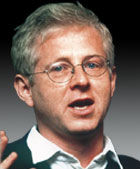 A prolific screenwriter, producer, and director for film and television, Richard Curtis has earned international renown for his award winning comedic storytelling. His most personal project—eradicating poverty worldwide—is a story still in production.
A prolific screenwriter, producer, and director for film and television, Richard Curtis has earned international renown for his award winning comedic storytelling. His most personal project—eradicating poverty worldwide—is a story still in production.
A New Zealander by birth, Richard Curtis is best known as the Oscar-nominated screenwriter for the popular British romantic comedies Four Weddings and a Funeral, and Notting Hill as well as the Mr. Bean television series. His most recently broadcast film, HBO’s Emmy-winning The Girl in the Café, asked hard questions about Third-World debt and poverty in Africa. In addition to co-founding the Make Poverty History campaign and the Live 8 concerts, Curtis founded Comic Relief UK in 1985 to raise money for victims of famine in Ethiopia.
Notes from this interview are included below.
- Changing is terribly important.
- You’ve got to make sure everybody knows what you’re trying to do. (clear vision)
- When hiring make sure you’re selecting people for the right reasons.
- The best leaders try to understand why people are not performing at their best.
- Don’t get too emotional about failure because failure may become part of the success.
- There is a sense that what is violent is true but what is happy and optimistic is sentimental (fantasy)
- Red nose days
- Video…
- Idol Gives Back
- By putting a famous person in the setting, it’s like sending a member of the family.
- Reduces the geography, the distance of the problem.
- Not embarrassed to ask people to do things because he believes people are looking for an opportunity to make a difference.
- Make Poverty History
- If you’re going to pray for people at night, you’ve got to get up and something the next day
- If the church takes a stand to halve poverty it could do it
- “If we stand together we can do anything.”
- What do you do well to rectify the injustice of global poverty?
Richard Curtis was a surprise for me. I didn’t expect him to be tall. I didn’t expect him to look that old. I didn’t expect him to hold my attention. I didn’t expect him to have such a compelling vision for the poor and the drive to make povery history.
I didn’t expect a comedy writer to have such an impact on the world in regards to poverty. I didn’t expect someone who doesn’t clearly point to God as his motivation to have such love and compassion for the poor of the world.
God used Mr. Curtis to touch me and remind me that love is powerful. God’s love is at work in all of us whether we are at a point of recognizing His work in us or not.
This session put together the other 3 sessions for me. The need for strategy and execution that Dr. Porter stressed, the need for leadership in tough situations from Colin Powell and the necessity of keeping fear out of leadership and staying true to our mission, (avoiding the pitfalls of our shadow mission) as related by John Ortberg. The story of Esther reminds us “Perhaps this is why you are in this position.” God is using Richard Curtis because he is faithful, available and willing.
I ask myself, am I faithful, available and willing to take action for God. Am I embarrassed to ask others to contribute to God’s vision to change the world? What is holding me back?
Am I living for the greater good?
I was very struck by a comment Mr. Curtis made that essentially said that he really only does one thing. BUT… he will find ways to use that one thing to make a difference for the world.
At first glance, I wonder, can it really be that simiple? But I think that that is the beauty of it. It is.
What if we each just found our one thing and used it to make a difference?
I’m committed to do just that. Find my “thing” and find ways to use that to make a difference.
Thank you for the comments from Jackie
that the rich have a heart for the poor
and a deep love for God.
The videos of the children were all to familiar to me. These are exactly the children that my husband, and I are trying to impact,and the sad fact is that their are millions of forgotten children, and when we see the footage. It is sad, we all cry but then what?
I am ashamed to say that asking people to help feed, and cloth these children is a burden. We seem to never want to ask for to much… we might make someone not like us or uncomfortable,but how else are you going to make a difference?
Maybe the exact people we are embarassed to ask are like Richard Curtis said ” Are just looking for a way to make a difference.”